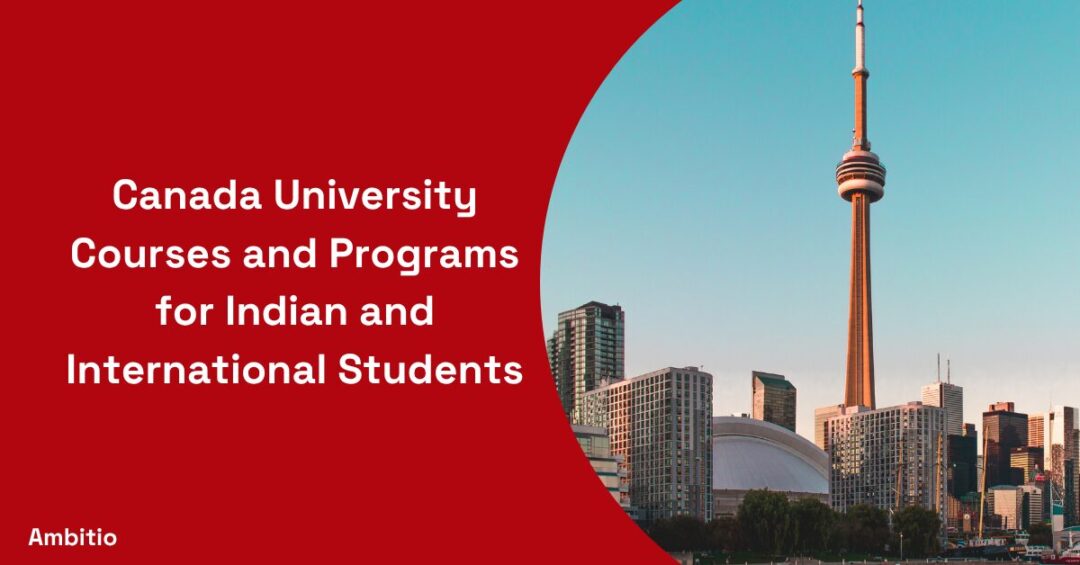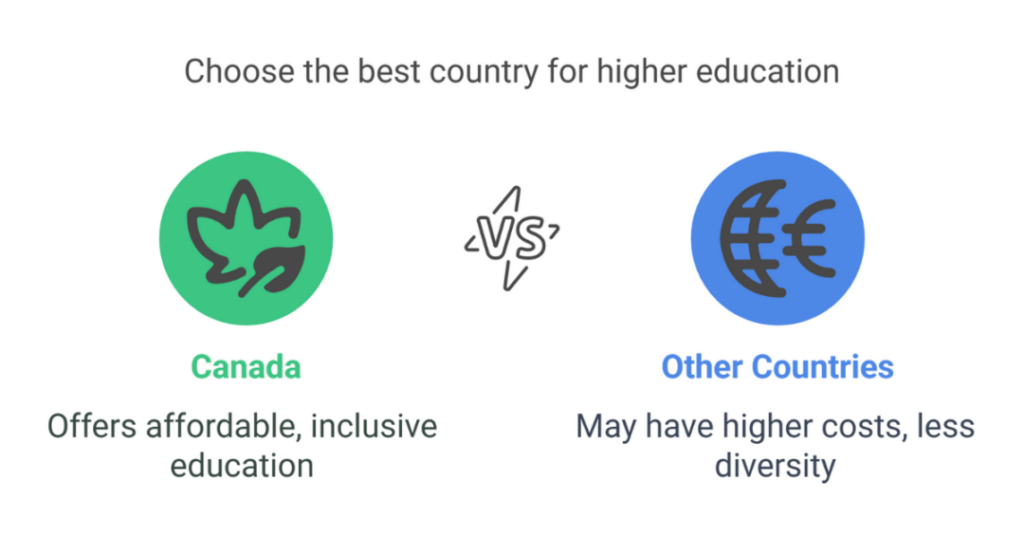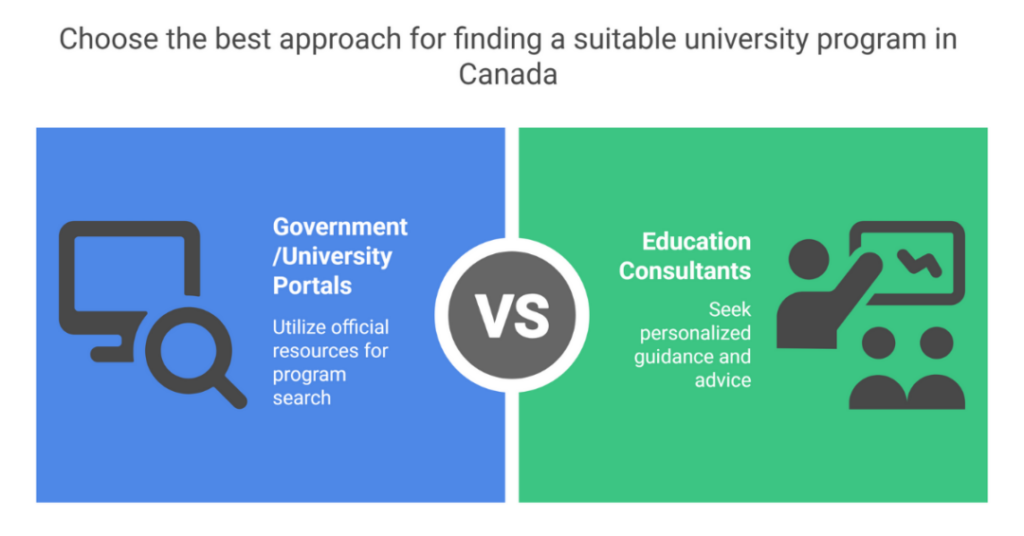23 June 2025
5 minutes read
10 Best Canada University Courses and Programs for Indian and International Students

Key Takeaways
- Canada university courses span engineering, business, and arts—offering hands-on, globally recognized education.
- Canada university courses blend interdisciplinary study with practical skills for a competitive edge worldwide.
- Canada university courses feature flexible admission requirements and affordable tuition for international students.
Canada has quickly become one of the foremost global destinations for international education. Boasting an open education system, rich subject matter fields, and globally accepted institutions, Canada presents a treasure pool of possibilities for both Indian and foreign students.
Whether you aspire to create the architecture of the future, break new ground in innovative technology, or explore the core of business administration, there’s an ideal program out there for you all across Canada.
Universities from Toronto to Ontario provide top-class campus life and experiential learning opportunities that give students real-world skills for the international industry.
Therefore, if you’re prepared to search through options of universities and begin your journey, Canada could be your starting point.
Why Study in Canada Universities as an Indian Student?
Fun fact: Over 40% of all foreign aspirants in Canada are Indian students.
- Canada offers world-class graduate and post-secondary programs in nearly every discipline, from science and engineering to art and education.
- Foreign students in Canada enjoy access to inclusive campus environments and multicultural experiences.
- Tuition fees are often lower compared to countries like the US and UK, making learning more affordable.
- Canadian universities provide fantastic housing, career guidance, and student counseling to facilitate your path.
- The Canadian education-system is research-intensive and strongly connected to the requirements of industry and innovation.
What are Some Popular Canada University Courses and Interdisciplinary Study Programs?
Fun fact: Canada is home to more than 100 public and private universities offering over 15,000 study programs.
1. Engineering and Technology
Engineering in Canada isn’t just a course—it’s a gateway to global innovation.
- Popular programs include software engineering, mechanical, civil, and electrical engineering.
- Required exams: IELTS, TOEFL, GRE, and in some cases SAT or ACT.
- Uni options: University of British Columbia, University of Waterloo.
2. Computer Science
From artificial intelligence to data science, Canada’s computer science programs are setting global standards.
- Leading courses: information systems, information technology, cybersecurity.
- Exams: IELTS, TOEFL, GRE.
- Top picks: Simon Fraser University, Carleton University.
3. Creative Arts
Canada nurtures creative industries with a splash of cultural flavor.
- Includes disciplines like fine arts, media, music, film studies.
- Needs: portfolio, personal statement, IELTS or TOEFL.
- Uni to consider: Emily Carr University of Art + Design, Ryerson University.
4. Education Studies
Want to lead change in classrooms? Degrees in Canada have you covered.
- Explore programs in educational psychology, inclusive learning, curriculum design.
- Required documents: SOP, letter of recommendation, IELTS.
- Uni options: University of Alberta, Queen’s University.
5. Architecture
Build the cities of tomorrow through sustainable and urban planning degrees.
- Key focus areas: sustainable design, urban planning, environmental architecture.
- Documents: SOP, LOR, resume, IELTS/TOEFL.
- Top schools: University of Manitoba, McGill University.

6. Agriculture
With growing focus on food security, agriculture is more vital than ever.
- Degrees include agronomy, soil science, food systems.
- Required exams: IELTS, TOEFL, GRE.
- University picks: University of Guelph, University of Saskatchewan.
7. MBA (Business and Management)
Canadian MBAs open doors in finance, HR, marketing, and entrepreneurship.
- Major areas: business administration, strategic marketing, corporate finance.
- Needs: GMAT, resume, SOP, letters of recommendation, IELTS/TOEFL.
- Options: McMaster University, York University.
8. Language and Culture Studies
These degrees provide insight into global linguistics and intercultural dynamics.
- Degrees: applied linguistics, global culture studies, translation.
- Needs: IELTS, SOP, academic transcripts.
- Institutions: Concordia University, University of Ottawa.
9. Mathematics
Canada universities are a powerhouse for applied mathematics and statistics.
- Popular degrees: pure math, statistics, actuarial science.
- Needs: SAT/GRE, IELTS/TOEFL.
- Good bets: University of Calgary, Dalhousie University.
10. Hospitality and Resource Management
If managing people and places excites you, this is your path.
- Subject areas: hospitality management, HR management, resource planning.
- Tests: IELTS/TOEFL, SOP.
- Alternate options: Vancouver Island University, Georgian College.
How to Find a Program that Suits You the Best and How to Apply to Canada Universities?
Fun fact: Canada’s official government website features a search tool to help foreign aspirants find the best-fit university programs.
- Start your research using government or university portals that let you filter by subject area, region, and degree type.
- Understand the application needs well in advance: personal statement, resume, SOP, and standardized tests.
- Seek career counsel from education consultants or counselors.
- Compare tuition fees and cost of living in various provinces such as Ontario or British Columbia.
- Make note of deadlines and ensure all documents are prepared.

Application Needs Table:
| Needs | Description |
|---|---|
| IELTS/TOEFL | Proof of English proficiency |
| GRE/GMAT/SAT/ACT | Depends on course and level of study |
| Statement of Purpose | Personal essay detailing goals and background |
| Resume | Academic and professional achievements |
| Letters of Recommendation | From teachers or employers |
What are the Admission Requirements and Fee Information for International Students in Canada Universities?
Fun fact: Tuition fees for foreign students in Canada can vary widely from CAD 7,000 to CAD 40,000 annually.
- Foreign students in Canada must demonstrate academic excellence and English proficiency.
- Some programs also require work experience or internships.
- Housing, health insurance, and other expenses are additional but manageable.
- Scholarships and financial aid are available at many Canada institutions.
- Application processing times and visa eligibility vary, so plan early.
Acceptance & Fee Table:
| University Type | Avg. Fees (CAD/year) | Key Acceptance Needs |
| Public Universities | 8,000 – 20,000 | IELTS/TOEFL, SOP, LORs, Resume |
| Private Institutions | 20,000 – 40,000 | Same as above + possible interview |
| Colleges | 7,000 – 15,000 | IELTS/TOEFL, Academic Transcripts |
Conclusion
Choosing to study in Canada is more than just enrolling in a program—it’s an experience that shapes your future. With access to diverse courses in science, engineering, technology, creative arts, and MBA, foreign aspirants find themselves immersed in a world-class education system.
From practical skills in information technology to innovation in agriculture and architecture, Canada universities deliver interdisciplinary studies that bridge theory with real-world impact. By understanding the needs, fees, and subject areas, students can apply strategically and secure their dream institution.
Whether you’re in Toronto or Ontario, the education opportunities in Canada are as vast as the country itself.
So go ahead with Ambitio, use that search tool, find a program that fits, and take the first step toward your global career. Canada is waiting—with campuses, cultures, and future doors wide open.
FAQs
What are the most popular Canada university courses for Indian students?
The most popular Canada university courses for Indian students include computer science, engineering, business administration, and creative arts.
Are Canada university courses affordable for international students?
Yes, Canada university courses are relatively affordable, with tuition fees ranging from CAD 7,000 to CAD 40,000 depending on the program and institution.
Do Canada university courses accept IELTS or TOEFL scores?
Most Canada university courses require either IELTS or TOEFL scores as proof of English language proficiency.
Can I apply to Canada university courses with a 3-year Indian undergraduate degree?
Many Canada university courses accept a 3-year Indian undergraduate degree, especially for business, education, and arts programs, though requirements vary by university.
What documents are required for applying to Canada university courses?
Common documents for Canada university courses include a statement of purpose, resume, letters of recommendation, academic transcripts, and standardized test scores.
Are there scholarships available for Canada university courses?
Yes, scholarships are available for Canada university courses at both undergraduate and graduate levels, offered by universities and provincial governments.
How can I find the best-fit Canada university courses for my career goals?
To find the best-fit Canada university courses, use government search tools, consult study abroad counselors, and compare programs based on subject areas and tuition.

You can study at top universities worldwide!
Get expert tips and tricks to get into top universities with a free expert session.
Book Your Free 30-Minute Session Now! Book a call now




























